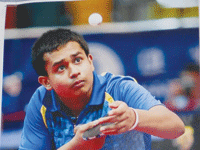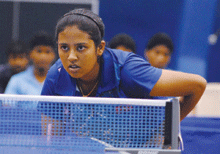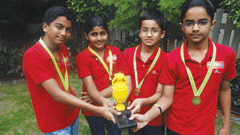 Siliguri (pop.1.9 million) is a nondescript city and commodities trading centre (tea, timber) in the Darjeeling district of North Bengal, sited on the banks of river Mahananda in the Himalayan foothills. Known as the gateway to the popular hill station of Darjeeling and the seven sister states of north-east India, it’s certainly not renowned for sports heroes.
Siliguri (pop.1.9 million) is a nondescript city and commodities trading centre (tea, timber) in the Darjeeling district of North Bengal, sited on the banks of river Mahananda in the Himalayan foothills. Known as the gateway to the popular hill station of Darjeeling and the seven sister states of north-east India, it’s certainly not renowned for sports heroes.
However, two table tennis players Soumyajit Ghosh and Ankita Das from Siliguri, won their way to the London Olympics 2012, after beating their more experienced Indian team mates in the Table  Tennis Asian Olympic Qualifi-cation Tournament held in Hong Kong, in April. In London, Soumyajit notched up a convincing win over higher ranked Brazilian Gustavo Tsuboi in the first round, but went down in the second. While Ankita, somewhat overawed by the occasion, lost in the first round. Despite their early exit, the duo’s wins over all domestic opposition and subsequent passage to London generated great excitement in Siliguri.
Tennis Asian Olympic Qualifi-cation Tournament held in Hong Kong, in April. In London, Soumyajit notched up a convincing win over higher ranked Brazilian Gustavo Tsuboi in the first round, but went down in the second. While Ankita, somewhat overawed by the occasion, lost in the first round. Despite their early exit, the duo’s wins over all domestic opposition and subsequent passage to London generated great excitement in Siliguri.
Soumyajit (19) is a first year arts student at Siliguri College, an only child of Harishankar Ghosh, a municipal corporation clerk, and his homemaker mother Mina. They are proud that he donned India colours and bested a much higher ranked player in the first round. “It was great to win the first round against a Brazilian player ranked 104 in the world but North Korea’s Kim Hyok Bong, who is ranked 77 and has beaten higher ranked opponents proved much too strong. Playing in London has given me good exposure to international table tennis standards,’’ says Soumyajit, who has been playing the game since age five and has been mentored by coaches of international repute, including, Bhawani Mukherji and Peter Karlsson.
Likewise, Ankita Das (18), a second year BA student of Siliguri College, enjoys a huge reputation in North Bengal. She won the national junior championship in 2007, a title she held for two years and is the reigning youth national women’s champion after winning the title in 2010 for the first time. But representing India in the London Olympics is the high point of her achievements. “Olympics is a big event and the pressure is tremendous. Having had the experience of playing in a truly international event, I’m sure I’ll do better if selected to represent India again,’’ she says.
Play on!
Baishali Mukherjee (Kolkata)
Young scientists
 Four young aspiring scientists — Rochan Avlur (13), Ritwik Jaisimha (12), Nayonika Nair (10) and Sidharth Santhosh (13), students of the Bangalore-based Delhi Public School (East) and Deen’s Academy — who call themselves SAP MoonWalkers 4.0, were finalists at the First Lego League (FLL) Open European Champ-ionships held in Mannheim, Germany from June 6-9. FLL is an international robotics competition for children in the age group nine-16, staged with the objective of stimulating interest in science and technology. This global robotics competition is a joint initiative of Manchester-based FIRST (For Inspi-ration and Recognition of Science and Technology), an organisation supported by a network of more than 3,500 spon-sors including corporates, educational and professional institutions and individuals and the Danish LEGO Group, the world’s third largest manufacturer of play materials. This year, the FLL European championships attracted 67 teams from 35 countries.
Four young aspiring scientists — Rochan Avlur (13), Ritwik Jaisimha (12), Nayonika Nair (10) and Sidharth Santhosh (13), students of the Bangalore-based Delhi Public School (East) and Deen’s Academy — who call themselves SAP MoonWalkers 4.0, were finalists at the First Lego League (FLL) Open European Champ-ionships held in Mannheim, Germany from June 6-9. FLL is an international robotics competition for children in the age group nine-16, staged with the objective of stimulating interest in science and technology. This global robotics competition is a joint initiative of Manchester-based FIRST (For Inspi-ration and Recognition of Science and Technology), an organisation supported by a network of more than 3,500 spon-sors including corporates, educational and professional institutions and individuals and the Danish LEGO Group, the world’s third largest manufacturer of play materials. This year, the FLL European championships attracted 67 teams from 35 countries.
The theme of the FLL Open Euro-pean Championship 2012 was ‘Food Factor — Keeping Food Safe’. All participating teams were expected to explore the topic of food safety and propose new solutions to prevent contamination from exposure to micro and macro organisms, nonsterile proces-sing and transportation, and unhygienic methods of prepar-ation and storage. “To get to Mannheim our team had to first win the Indian FLL organised by Techtronics Education and SAP labs. Over 200 teams from across India participated. In January this year, we were awarded the first prize in the category of ‘Best Robot Design’ and a passage to Mannheim,’’ says Ritwik.
The judges of the Mannheim compet-ition assessed the team’s solution as “exceptionally well-considered and creative, with good potential to solve the problem researched,” and awarded them the first prize in the innovative solutions category.
Back home after their triumph in Germany, the youngsters believe they have gained a lot from this experience. “The best outcome of this competition was that we learnt the benefit of team work,” says Sidharth. “That our project was among the final entries boosted our confidence,” adds Nayonika.
These youngsters are not ones to rest on their laurels and want to take their research forward. “We now want to devise a cocktail of bacteriophages which will prevent infection at the field level. This will help farmers econom-ically and ecologically,” enthuses Rochan.
Way to go, guys!
Sangeeta Venkatesh (Bangalore)